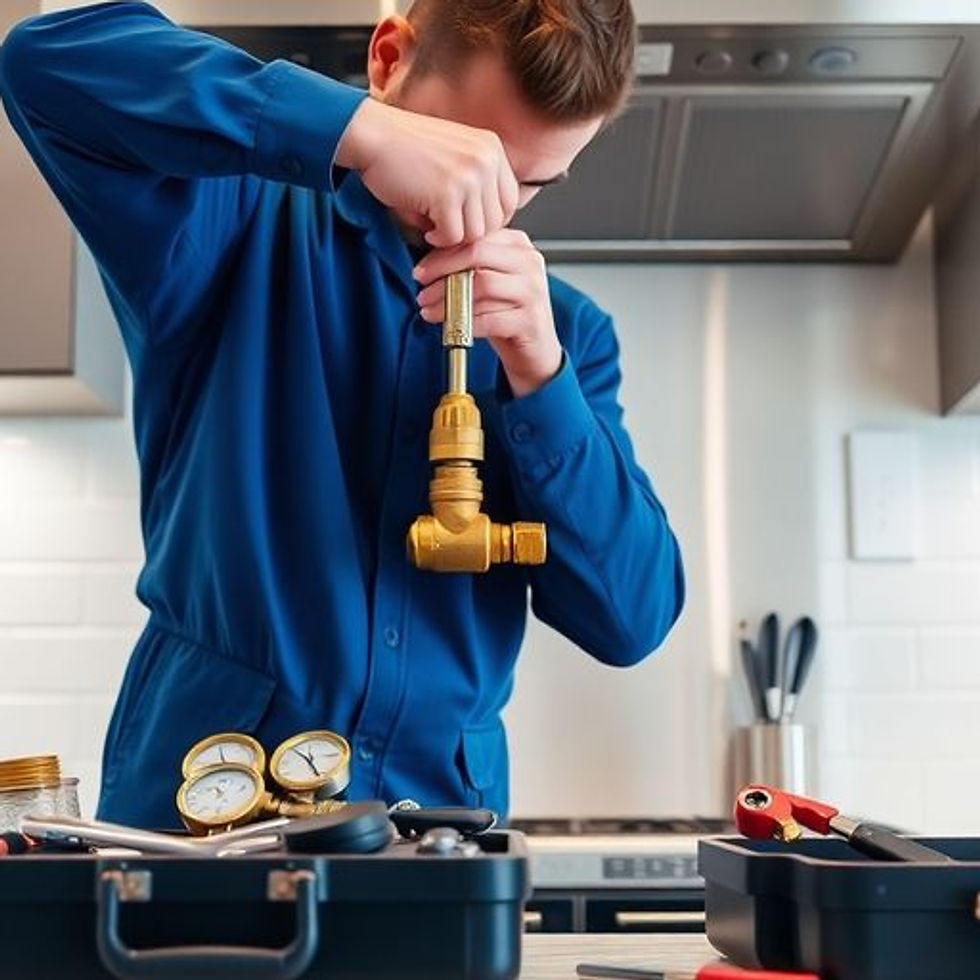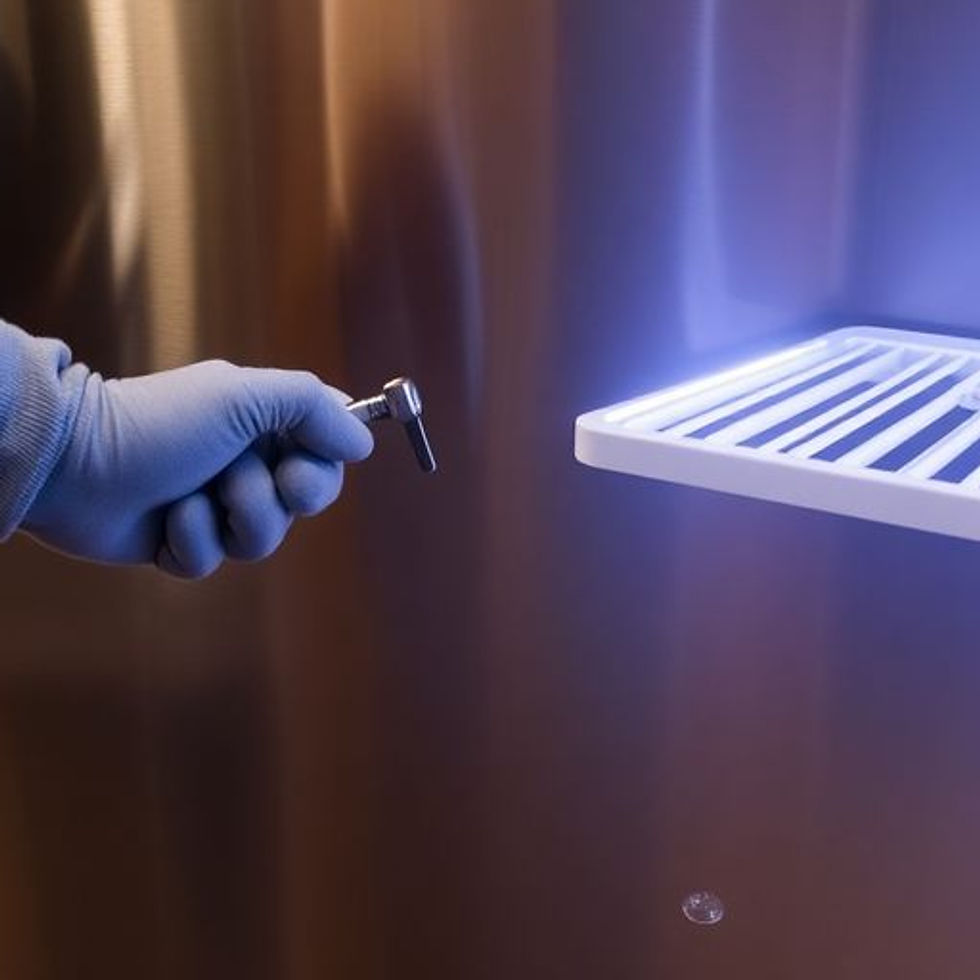Top Tips for Maintaining All Appliances in Your Home
- ZIv H

- Sep 1, 2024
- 7 min read
Keeping your home appliances in good working order is essential for a smooth-running household. Regular maintenance can help extend the lifespan of your appliances, save you money on repairs, and ensure they operate efficiently. Here are some top tips to help you maintain your home appliances effectively.
Key Takeaways
Regularly check air vents for dust and debris to keep appliances running smoothly.
Clean refrigerator coils and rubber gaskets to maintain efficiency.
Inspect hoses and connections on appliances like washing machines and dishwashers to prevent leaks.
Replace or clean filters as recommended by the manufacturer to improve performance.
Keep power cords in good condition to avoid electrical hazards.
1. Refrigerator
The refrigerator is one of the most important appliances in any home, keeping food fresh and safe to eat. To ensure its longevity, follow these tips:
Clean the coils: Dust and dirt can build up on the coils, making the fridge work harder. Use a vacuum or brush to clean them every six months.
Check the door seals: Make sure the seals are tight to keep the cold air in. If they are loose, replace them.
Set the right temperature: Keep the fridge at 37°F and the freezer at 0°F for optimal performance.
Organize the contents: Keep the fridge organized to allow air to circulate. This helps maintain a consistent temperature.
Defrost the freezer: If your freezer doesn't have an auto-defrost feature, defrost it regularly to prevent ice build-up.
For more tips on keeping your appliances in top shape, check out our article on how to clean stainless steel appliances: tried-and-true methods keeping-your-stainless-steel-appliances-sparkling-clean.
2. Dishwasher
Dishwashers greatly help the kitchen but need regular care to work well. Clean the filter often to prevent clogs and keep things running smoothly. Also, check and clean the spray arms to ensure water spreads evenly during cycles.
Run an empty cycle with a dishwasher cleaner now and then for a deep clean. Make sure to use the right detergent and follow what the maker says. Load dishes correctly to help with cleaning and avoid blocking the spray arms.
Consider using a water softener to prevent mineral buildup if your home has hard water. If your dishwasher leaks frequently, it might be time to call a specialist.
3. Washing Machine
Regular Cleaning
It's important to clean your washing machine periodically. Our experts recommend running the clean cycle every 40 washes. Check your owner's manual for the right cleaning product. If you have a front-loading machine, it uses less water than top-loaders, so detergent and dirt might not thoroughly rinse away. This type may need extra attention.
Preventing Odors
Leave the washer door open after each use to let the drum dry. This helps prevent musty odours. Monthly cleaning with white vinegar or a washing machine cleaner can also remove bacteria and smells.
Load Size
Avoid regularly putting heavy loads into the washing machine. Small loads are better for the machine and help it last longer.
Levelling the Machine
Ensure the washing machine is level to prevent excessive vibrations. This can help avoid damage to the machine and your floor.
Inspecting Hoses
Regularly inspect the washing machine hoses for signs of wear or leaks. If necessary, replace them to prevent water damage.
4. Dryer
Regular maintenance is key to keeping your dryer running smoothly and safely. With good care, your dryer should last 13-14 years.
Lint Filter Cleaning
After each load, clean the dryer’s lint filter with a paper towel or a brush. Leftover lint can be a fire hazard if it collects in the burner area or around the heating element.
Exhaust Cleaning
Other areas to clean on your dryer include the accordion hose and dryer exhaust. Remove clumps of lint from the tubing and the hole in the back to ensure these parts don't become clogged. Vacuum these parts and then properly reattach them.
Light Loads
Don’t overload your dryer, or you risk wearing out the motor.
Pocket Protection
Check clothes pockets for paper, coins, or other forgotten items before you run the dryer. Foreign items lodged in the dryer can cause problems.
Fire Hazards
While your washing machine can cause flooding, your dryer unit possesses many fire hazards. One fundamental way to prevent fire hazards in your dryer is to clean out the lint trap after every load of laundry. Cleaning out the lint also helps your dryer heat up properly so that your clothes get dried. Sometimes, the lint filter also needs to get cleaned or replaced if lint is stuck to it.
5. Oven
The oven is a key appliance in any kitchen, but it needs regular care to work well. Clean your oven after each use to prevent food from hardening and sticking to the sides. A simple paste of vinegar, soap, and baking soda works wonders for this task.
Calibrate Oven Temperature Settings
Make sure your oven's temperature settings are accurate. Consult a specialist if your stove fails to heat up or maintain the desired temperature.
Clean Oven Racks Separately
Remove and clean the oven racks separately to ensure they stay in good condition. This helps maintain the oven's overall performance.
Replace Oven Light Bulbs
Don't forget to replace the oven light bulbs as needed. This small step can make a big difference in your cooking experience.
Avoid Harsh Chemicals
Use gentle cleaning agents on oven surfaces to avoid damage. Harsh chemicals can wear out components faster.
Ensure the Oven Door Has a Tight Seal
A tight seal on your oven door is crucial. If the seal is compromised, your oven can lose more than 20 percent of its heat, making it energy-inefficient and causing your food to cook unevenly.
6. Microwave
Regular Cleaning
To keep your microwave in top shape, clean it regularly. A simple trick is to fill a microwave-safe container with two cups of water and two tablespoons of vinegar. Microwave this mixture for three to five minutes. Leave the door shut for a few more minutes to let the steam work. Finally, wipe down the interior with a sponge or cloth.
Avoid Metal
Never put metal objects inside the microwave. Metal can cause sparks and damage the appliance. Always use microwave-safe containers.
Check the Door Seal
The door seal is crucial for the microwave's efficiency. Ensure the seal is intact and free from food particles. A damaged seal can lead to energy loss and uneven cooking.
Use the Right Settings
Different foods require different settings. Follow the manufacturer's guidelines for cooking times and power levels. This helps in cooking food evenly and prevents damage to the microwave.
Ventilation
Proper ventilation is essential for the microwave to function efficiently. To avoid overheating, make sure the vents are not blocked and clean them regularly.
7. Air Conditioner
Air conditioners make hot summers bearable, and they can perform efficiently for many years with proper care.
Replace or Clean Air Filters
Dirty filters restrict airflow and reduce efficiency. Replace or clean them according to the manufacturer’s recommendations.
Schedule Professional Maintenance
Annual check-ups by a professional can identify and fix issues before they lead to bigger problems.
Regularly Clean Filters and Vents
Many appliances, such as air conditioners, have filters and vents that need regular cleaning. Clogged filters and vents can strain the appliance and reduce its efficiency. Clean or replace these components as recommended in the user manual.
Change Air Filter for A/C Unit
Dirty air filters restrict airflow, which results in lower energy efficiency and a shorter lifespan for your A/C unit. A simple solution is to change out the air filter regularly. As a general rule of thumb, air filters should be cleaned every two to four weeks.
8. Water Heater
Regular Draining
If you take care of your water heater, it can last a long time. However, minerals can build up inside, making it less efficient. Therefore, drain your water heater at least once a year to remove sediment and debris.
Insulation
Covering your water heater with a blanket can help keep it warm. This way, it won't lose as much energy to the air around it.
Professional Help
If your water heater has serious problems, it's best to call a local home appliance servicer for help.
9. Vacuum Cleaner
Regularly Empty the Dustbin
To keep your vacuum cleaner working well, empty the dustbin after each use. This helps maintain suction power and prevents clogs.
Clean or Replace Filters
Many vacuum cleaners have filters that need to be cleaned or replaced regularly. Check your user manual for guidance on how often to do this.
Check for Blockages
Inspect the hose and attachments for any blockages. Remove any debris to ensure smooth operation.
Maintain the Brush Roll
The brush roll can get tangled with hair and fibers. Clean it regularly to keep it spinning freely.
Store Properly
Store your vacuum cleaner in a cool, dry place. This helps prevent damage to the motor and other components.
For more information on home appliance brands, you can check the category:home appliance brands on Wikipedia, which lists numerous home appliance brands categorized alphabetically. This includes well-known brands like Whirlpool, LG, Samsung, and Bosch.
10. Garbage Disposal
Regular Cleaning
To keep your garbage disposal working well, you need to clean it often. First, turn off the disposal and check the drain for large food pieces. If you find any, use tongs to remove them. Then, mix ice cubes and salt, hot water, or vinegar to clear out any other stuck food bits.
Deodorizing
To eliminate bad smells, put citrus peels in the disposal, run cold water through it, and turn it on. This will make it smell fresh and clean.
Resetting the Overload Feature
Garbage disposals have an overload feature that shuts off the power if the motor gets too hot. Once it cools down, press the reset button on the side or bottom of the unit.
Cleaning the Splash Guard
Your disposal will smell better if you clean the splash guard. Lift the flaps and scrub them with a toothbrush and grease-cutting cleaner.
Conclusion
Taking care of your home appliances doesn't have to be a daunting task. By following some simple maintenance tips, you can keep them running smoothly and extend their lifespan. Key steps include regular cleaning, checking for wear and tear, and following the manufacturer's guidelines. Remember, a little effort now can save you a lot of trouble and expense in the future. Keep your appliances in top shape, and they will continue to serve you well for years.
Frequently Asked Questions
How often should I clean my refrigerator coils?
To keep your refrigerator running efficiently, it would be best to clean the coils at least twice a year.
What is the best way to clean the dishwasher?
Run an empty cycle with a cup of white vinegar on the top rack. This helps remove buildup and odours.
How can I prevent my washing machine from smelling bad?
Leave the door open after each use to let it dry out, and run a cleaning cycle with vinegar once a month.
How often should I check the air vents in my appliances?
Check the air vents every few months to ensure they are dust and debris-free.
What should I do if my oven isn't heating correctly?
First, check the heating element for any visible damage. If it looks fine, it might be time to call a professional.
How can I maintain my vacuum cleaner?
Empty the dustbin or replace the bag regularly, and check the filters for any clogs.













Comments